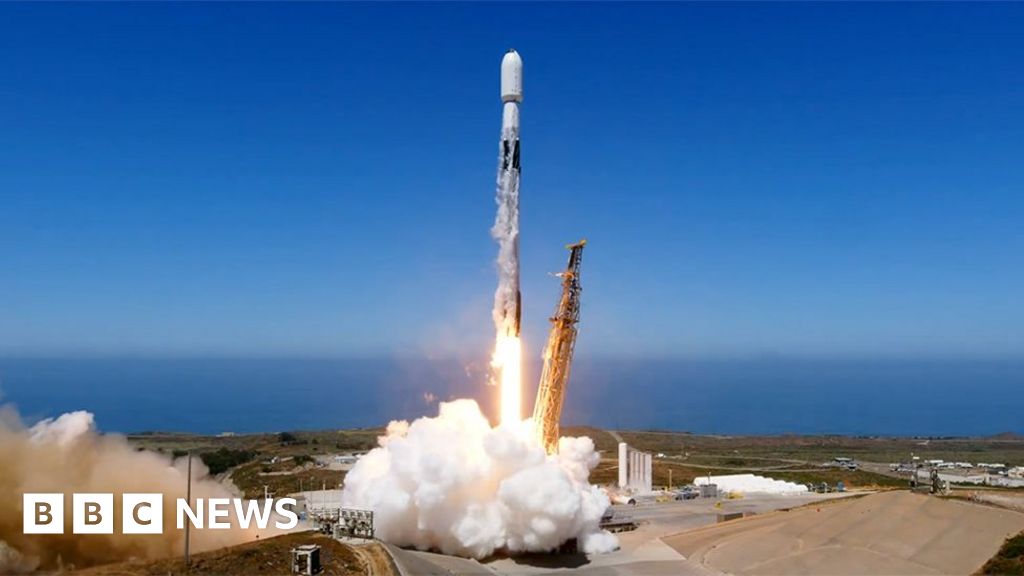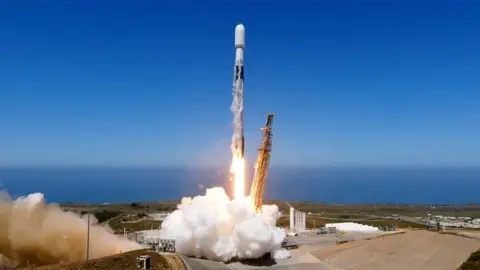 SpaceX
SpaceXThe UK military has launched its first ever dedicated Earth-imaging satellite.
Called Tyche, the washing machine-sized spacecraft will have sufficient resolution to identify battlefield troop positions and vehicles.
It’s a demonstrator that should be followed by a network of satellites this decade using a variety of sensors.
Some of these future spacecraft will be able to see through cloud and even eavesdrop on radio transmissions.
Tyche’s ride to orbit was booked on a SpaceX Falcon rocket flying out of California. Lift-off occurred at 11:56 local time (19:56 BST).
The British mission will circle the globe at an altitude of roughly 500km, where it’s expected to operate for at least five years.
UK forces have long benefited from the use of their own, state-of-the-art satellite communications system, called Skynet, but getting access to surveillance and reconnaissance imagery from space has largely required a friendly request to allies, particularly the United States.
And while the Ministry of Defence (MoD) has contributed funds in the past to projects in the UK commercial sector, Tyche will be its first wholly owned imaging capability.
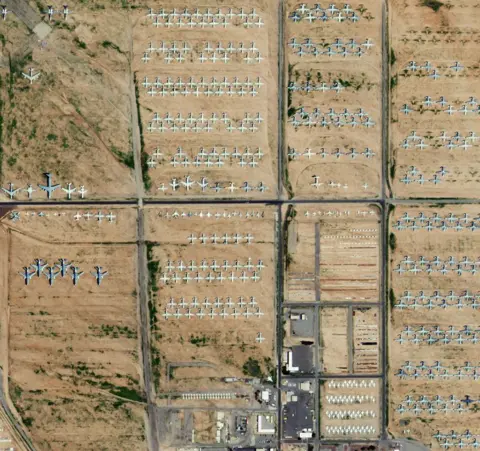 SSTL/S1-4
SSTL/S1-4Commissioned by UK Space Command and built by Surrey Satellite Technology Ltd (SSTL) in Guildford, the 160kg satellite will collect its imagery at optical wavelengths – in the same light we sense with our eyes.
It’s designed to capture 5km-wide spot scenes on the ground and have a best resolution of 90cm.
This is by no means the best performance possible (some classified US satellites are reported to see features as small as 10cm across), but it fits with the British military’s generalised needs.
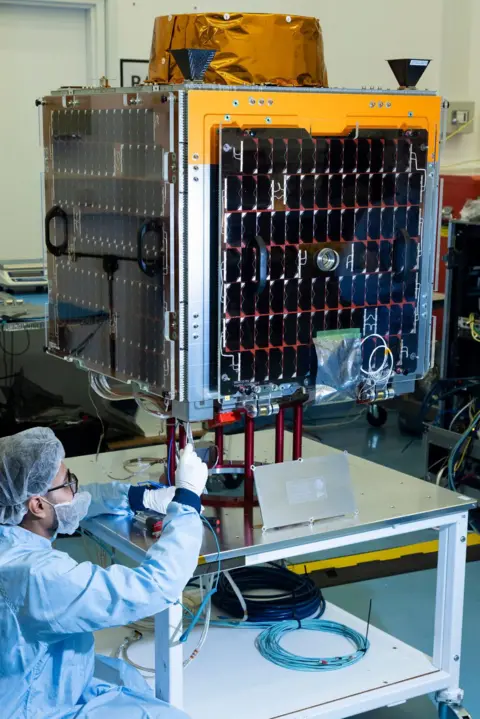 SSTL
SSTLTyche was born out of a 2021 Space Command Paper and a 2022 Space Defence Strategy, which committed the last government to spend £970m over 10 years on a programme called Intelligence, Surveillance, Target Acquisition, and Reconnaissance, or ISTARI.
This set out a number of initial R&D efforts with the eventual goal of launching a sovereign constellation of military and national security satellites to orbit.
These spacecraft are intended to carry a range of technologies, among them radar sensors that can see the Earth’s surface in all weathers and at night – a capability Ukraine has found invaluable in tracking invading Russian forces.
“This is the start of a journey,” said Maj Gen Paul Tedman, commander of UK Space Command. “The space defence strategy lays out how we’re going to become a meaningful space power by 2030.
“We’re hoping to see many more launches of satellites in the coming months and years. Tyche is absolutely the beginning of that.”
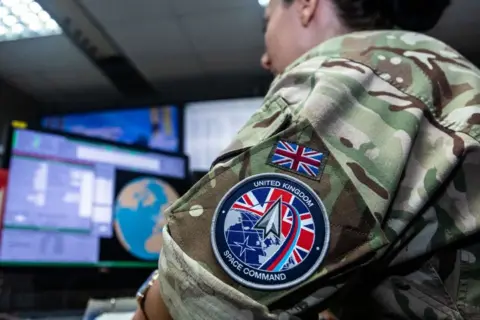 UK Space Command/Crown Copyright
UK Space Command/Crown CopyrightSSTL has been working closely with UK Space Command on ISTARI and hopes to win further defence contracts, at home and abroad.
“Many other countries are setting up space commands,” said Darren Jones, the manufacturer’s head of defence business.
“There’s lots of appetite around the world for space capabilities for defence purposes. What this Tyche contract shows for us is that we’ve got confidence from the MoD to deliver these types of missions, which can only help us in future with other nations around the globe.”
Tyche is based on the company’s Carbonite model, which can be assembled rapidly and at relatively low cost (the Tyche contract is worth £22m).
One interesting feature is its propulsion system which manoeuvres the satellite using water.
“The water goes through a thruster that heats it up to make superheated steam. That’s how we get thrust and do station-keeping,” explained chief technology officer Andrew Haslehurst.
“Tyche carries 10 litres. It’s enough to get five-to seven years of in-orbit life.”
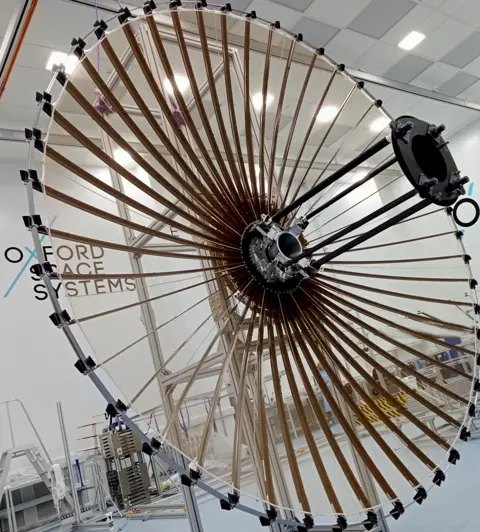 OSS
OSSShortly after the Defence Space Strategy was published, the then Commons Defence Select Committee criticised the UK for being, “at best, a third-rank space power”. Britain is the only G8 nation without a sovereign satellite imaging capability.
The committee raised specific concern for ISTARI’s future prospects, given the MoD’s “woeful track record in delivering major projects on time and to budget”.
A new government was elected in July, of course, and immediately initiated a root and branch review of UK defence needs and spending.
With other countries highlighting the growing importance of the space domain in future conflicts, it seems unlikely the latest UK defence assessment will tack a different course to the last one. But policy experts would be watching closely, said Julia Balm, research associate at the Freeman Air and Space Institute, King’s College London.
“I think if there’s anything negative on ISTARI or there are any cutbacks when it comes to things that have already been committed in strategies, then that’s just indicative of the UK’s inability to deliver any sort of long-term or large-scale project. And it also doesn’t really hold a good message about the UK being committed to growing as a space power,” she told BBC News.
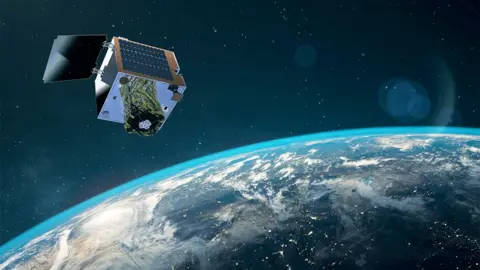 SSTL
SSTL
